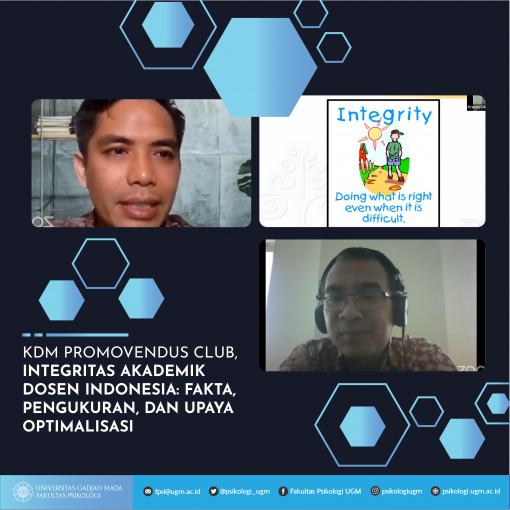
The Promovendus Club for the Doctoral Program in Psychology UGM again held a colloquium which is routine every two weeks on Friday (4/6). This colloquium activity raised the topic “Academic Integrity of Indonesian Lecturers: Facts, Measurements, and Optimization Efforts” which was delivered by Dr. Prasetyo Budi Widodo, S.Psi., M.Sc. Prasetyo is an alumni of the UGM Psychology Doctoral Program who is a lecturer at Diponegoro University.
Integrity is one of the problems experienced by officials in Indonesia. In general, integrity can be accessed in two ways. First, fidelity to understand and practice good values according to moral principles that do not conflict with social values. Second, integrity is a complete individual character to carry out moral principles.
Departing from integrity issues which also made Prasetyo decide to conduct research on the topic. Involving 823 subjects who are lecturers in Indonesia, Prasetyo conducted research on academic integrity. “In 2015, 2016 it was very difficult to find articles about academic integrity. Well, what’s surprising is that around 2017 suddenly there were so many articles about academic integrity. I was confused as to why it suddenly became so many,” said Prasetyo.
In the past, integrity was studied in many fields in industry and organizations, especially in integrity research involving employees as subjects. In addition, the preparation of integrity measuring instruments in the industrial field and was originally intended to lie detection test. Apart from industry and organization, integration research is also conducted in education, namely academic integrity research. Academic integrity research conducted is related to the incidence of fraudulent practices, especially cheating by students.
There are 4 keywords that can be used to search the literature on academic integrity consisting of academic integrity, educational integrity, academic honesty, and academic dishonesty. Because honesty is the main of integrity, although along the way, integrity will get additional other values. Therefore, academic integrity can also be interpreted as an individual commitment to realizing the values of honesty, trust, justice, and responsibility. This meaning was pioneered by the International Center for Academic Integrity (ICAI), which is an association of universities in America that focuses on academic integrity.
Initially ICAI defined academic integrity with five values, but in 2013 ICAI added one value, namely courage. The value of courage according to ICAI is a value that can implement the other five values. Without courage, individuals cannot realize other values contained in the meaning of academic integrity.
Furthermore, in this colloquium material, Prasetyo also said that academic integrity is the hallmark of a human learner. Apart from being important for the implementation of the mission of the university, integrity also related to the reputation of a university. According to Prasetyo, the enforcement of academic integration can be done through detection as a form of effort whether there is a lack of academic integrity in lecturers. Therefore, a measuring instrument with high reliability and validity is needed. In addition, the enforcement of academic integrity can be done through the application of rules and socialization that can be delivered through lectures or the installation of banners.
